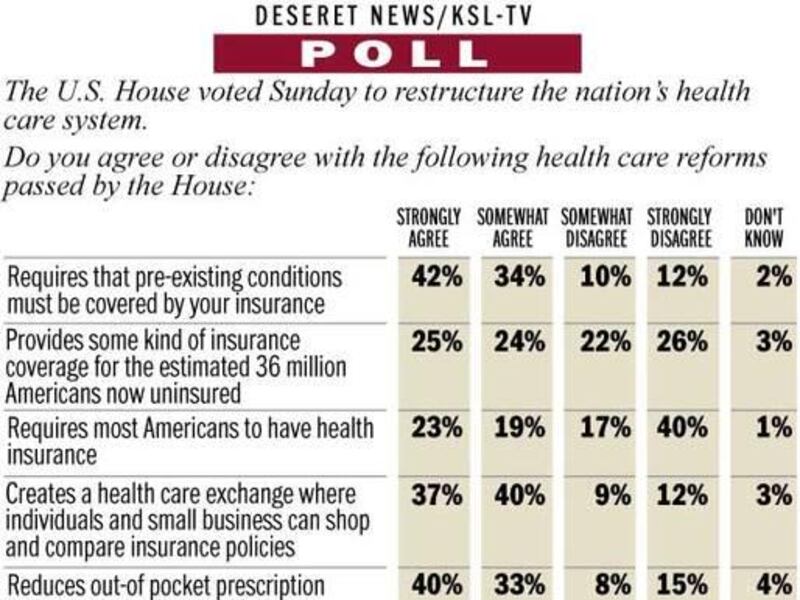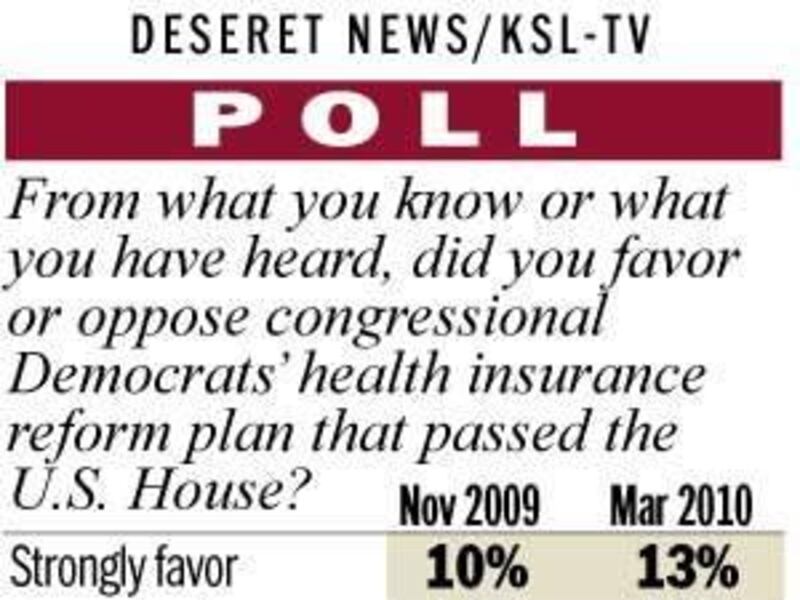SALT LAKE CITY — Most Utahns remain steadfastly against the structural changes in the health care overhaul bill President Barack Obama is to sign into law today, but they like some of the nuts and bolts in the plan.
A KSL/Deseret News statewide survey taken Monday night shows that 67 percent of Utahns either somewhat oppose or strongly oppose the congressional Democrats' health insurance reform plan that passed the U.S. House on Sunday.
That's an increase of 1 percent over the 66 percent of residents polled in November by Dan Jones & Associates.
However, when asked about a few specifics in the landmark 2,700-page, nine-year plan, more than three-fourths of the respondents agree with requiring private insurers to cover pre-existing conditions, a loophole that carriers use to exclude or drop plan members they deem too sick and too expensive.
Utahns also overwhelmingly agree with closing the difference between what Medicare pays for prescription drugs and what seniors pay out of pocket.
An even larger portion of poll respondents said they support the reform's plan to create a Web-based health exchange where individuals and small businesses can shop for and compare insurance polices and eventually check treatment outcomes of hospitals and clinics.
More than half disagree — 40 percent of them strongly disagree — with the requirement that most Americans be under some kind of insurance plan by 2014. More than 40 percent agree with the requirement.
That won't happen without nearly all Americans getting themselves insured, and that won't happen unless they're forced to, at least as far as federal reformers are concerned.
The reform's ultimate goal, some kind of insurance for more than 30 million Americans who have no health insurance by 2019, is a wash among Utahns polled Monday evening, with 49 percent in favor and 48 percent against.
The survey results are counter to a poll this past spring by Dan Jones that showed nearly 80 percent of Utahns believe that access to a basic health care plan is as much a right for U.S. citizens as access to a basic education.
As Utah health care providers and policy advocates observed Monday, the rub comes from who is proposing insurance for all and how it's going to be achieved.
"I would encourage everyone to educate themselves on that aspect and other provisions in the bill," said Judi Hilman, executive director of the Utah Health Policy Project research and advocacy group that regards the passage and today's scheduled signing of health care historic and a necessary step that shows that the United States is ready to face the job of comprehensive health care reform.
And the reform isn't the doom that many Utahns believe it is, Hilman added, noting that UHPP will continue another year of statewide public discussion conferences to explain what the bill does and when.
"Too many Utahns have no idea what is in the legislation and how it will provide them with peace of mind, stability, security and health care insurance they can count on," Hilman said.
The insurance companies and their investors apparently don't share the same qualms about mandating insurance for everyone in order to get everyone insured. Stock in the major health insurance companies jumped several percentage points on Monday.
Even hinting of mandates has been avoided by the architects of Utah's separate reform effort, now in its third year and ahead of federal reformers in setting up statewide health exchange and other reforms approved by the U.S. House.
Utahns remain against mandates, according to the survey. So are the architects of Utah's own separate reform effort who pride themselves on keeping Utah reforms mandate-free, for both individual and family insurance purchasers and employers who offer plans as a fringe benefit.
"The light hand of the free market rather than the push of government mandate is crucial to the success of the reform plans in Utah," said House Speaker Dave Clark, R-Santa Clara, the state legislator and point man for Utah-style reforms.
"People are right to be wary of sweeping changes out of Washington," Clark said. "We are more than wary. We're not absolutely anti-Washington, and they've said they want to partner with states. But the way this was done, this was the opposite of partnering."
The poll was a random telephone survey of 406 Utahns with a sampling error of plus or minus 5 percent.
e-mail: jthalman@desnews.com


